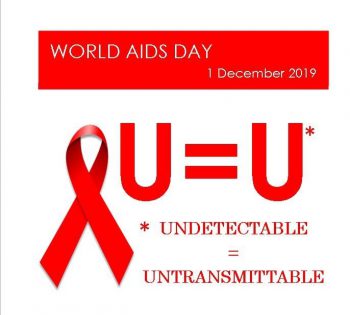1st December 2019

As part of World AIDS Day (1 December) the Public Health Agency (PHA) and the Southern Health and Social Care Trust are encouraging everyone to practise safer sex and get tested early if they have put themselves at risk. This year the Southern Health and Social Care Trust is delivering the theme of Undetectable = Untransmittable.The Trust, in partnership with Positive Life, delivered information sessions to students within Southern Regional College to raise awareness of HIV and also organised HIV information stands available to staff and visitors at two of its hospital sites – Daisy Hill and Craigavon.
HIV (Human Immuno-Deficiency Virus) is a virus that attacks the immune system and can slowly destroy it. There is currently no cure for HIV however is it a manageable lifelong condition and with advances and adherence to treatment, people can live a more or less a normal lifespan.
Evidence has proven that people taking effective treatment for HIV as prescribed along with regular checks of their viral load, cannot transmit the virus to others. Therefore if a person with HIV has an Undectectable viral load, HIV is Untransmittable (U=U).
With more and more people becoming aware of this, it could potentially dispel the myths and reduce the stigma associated with HIV that people face on a daily basis.
By sharing this message it is also hoped that HIV transmissions will continue to come down by encouraging more people to test for HIV and to accept treatment. We know many people still avoid getting tested for fear of the result and because of misconceptions about what the virus means in terms of their health, relationships, employment and family life, but having the knowledge that getting on to treatment means you can live a long healthy life without fear of passing on the virus should reduce these barriers
A new report from the PHA shows that there are 1,130 people in Northern Ireland living with HIV. The ‘HIV surveillance in Northern Ireland 2019’ report also shows that 84 new first-UK cases of HIV were diagnosed here in 2018. The report provides analysis of the HIV data for Northern Ireland in 2018 and trends over the years.
Dr Claire Neill, Specialty Registrar in Public Health at the PHA, said: “The report shows a four percent increase in the number of people living with HIV in Northern since 2017 (1,085). Ninety-eight percent of those receiving care, and where route of transmission was known, acquired their infection through sexual contact.
“Many people who are living with HIV have no obvious signs or symptoms. The only way of knowing if you have the virus is by taking a HIV test. It is important not to delay seeking advice and taking this test if you feel you have been at risk.”
Of the 84 new first-UK cases of HIV which were diagnosed in Northern Ireland, 43 (51%) occurred in men who have sex with men (MSM), while 31 (37%) occurred after heterosexual transmission. Thirty (42%) new HIV diagnoses were made at a late stage.
Dr Neill continued: “While there has been a small reduction in late diagnoses of HIV, a significant number of people are still being diagnosed at a late stage, which means that the virus may have already had a significant impact on their health. It is estimated that the majority of onward transmission is from those with undiagnosed HIV. So, it is really important for people to get tested early if they think they have put themselves at risk.
“It is also important to stress the importance of taking steps to reduce your likelihood of contracting the virus. If you have unprotected sex, you could effectively be sleeping with everyone your partner’s ever slept with, putting yourself at risk of getting HIV and other sexually transmitted infections (STIs). If you are sexually active, use condoms, limit your number of sexual partners and get tested quickly if you think you might be at risk.”
The report is available at www.pha.site/HIVreport2019.
HIV testing is available from regional GUM services, GP practices as well as the community organisations Rainbow and Positive Life.
For more information on HIV testing services and to book an appointment with the GUM clinic to get tested check out:
- GUM (Genitourinary Medicine) 028 3756 2080
- Health Hub (16-25 year olds)
health.hub@southerntrust.hscni.net
Model SRC – Monday 0900-1200
Greenbank SRC – Monday 0900-1200
Newry East SRC – Monday 1400-1600
Lurgan SRC – Tuesday 0900-1200
Dungannon SRC – Tuesday 1400-1600
Armagh SRC – Wednesday 0900-1200
Portadown SRC – Thursday 0900-1200
Banbridge SRC – Friday 0900-1200




